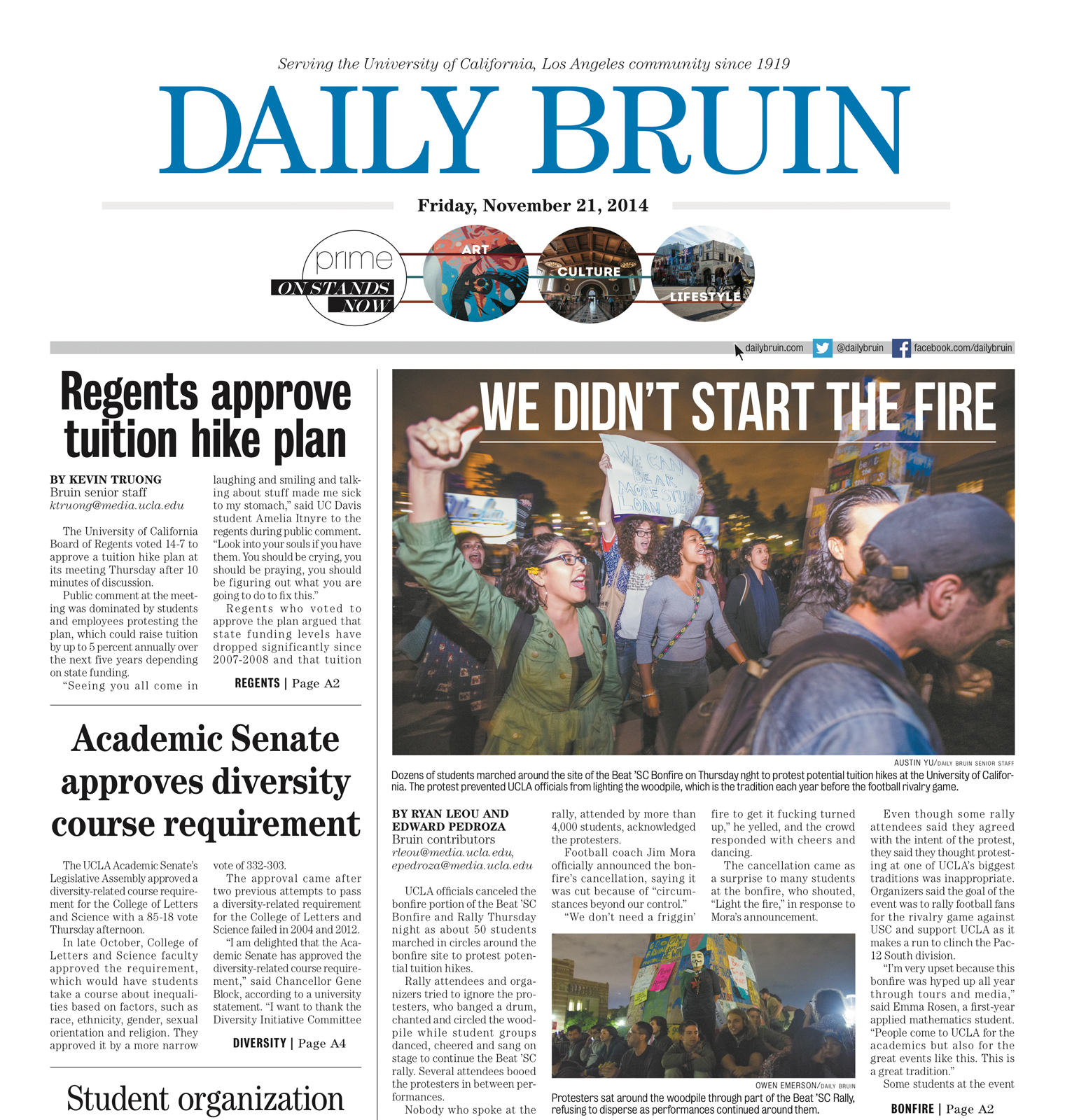Throwback Thursday: Tuition increases through the years

(Daily Bruin archives)
By Sravya Jaladanki
Feb. 9, 2017 3:32 p.m.
Surprise, surprise! UCLA’s tuition has gone up again.
If you’re like me and have been hibernating in your room studying for midterms, you probably didn’t know that the University of California Board of Regents adjourned yet another meeting on how to make our lives more miserable. Most recently, they approved a tuition increase of 2.5 percent for the 2017-2018 academic year. But I don’t know what shocks me more – the fact that the UC system managed to find another reason to increase our tuition or the fact that no one felt compelled to say much about it.
Tuition hikes aren’t a new concept to the UC system. In 2011, a 9.6 percent tuition increase was approved for the next academic year. That $1,068 increase was built upon an already approved 8 percent tuition increase that was also set to be implemented in fall of 2011. The combined tuition hikes brought a $1,818 increase in tuition from the previous year, a largely controversial decision.
At UC Davis, the Occupy UC Davis movement garnered headlines as students peacefully protesting against tuition costs were pepper-sprayed by a police officer. At UC Berkeley, similar protests rang out as a result of waning patience with tuition hikes.
In November 2014, an incremental 5 percent increase in tuition plan was approved by the regents. According to the UC Office of the President, the plan was intended to play “a critical role in the University’s immediate and long-term budget strategy, which includes aggressive cost-cutting measures, efforts to maximize operational efficiency, and developing alternative revenue sources.” The plan would have affected students enrolled in the 2019-2020 school year, raising in-state and out-of-state tuition and fees to $15,564 and $44,766, respectively.
Protests similar to those from the 2011 tuition hike rang out at universities across California. UC Berkeley yet again organized protests with 250 students to voice concerns over the growing cost of their education. Roughly 200 students at UC Santa Cruz and over 100 students at UCLA also participated in protests on their campuses. UCLA’s annual Beat ‘SC bonfire was canceled in 2014 due to protesters rallying around the bonfire site.
Students’ efforts proved to be effective, as Gov. Jerry Brown and UC President Janet Napolitano agreed to freeze tuition costs for two years. The freeze did not, however, apply to out-of-state students. Napolitano proposed to raise supplemental fees for out-of-state students by as much as 8 percent.
Flash-forward to present-day and, yes, there is another tuition hike to protest against. The increase will be covered for two-thirds of the UC system’s California residents, but nonresident students will end up paying this extra money out of pocket.
There is, however, a slight distinction between the most recent tuition hike and those in the past decade. The protests against this tuition hike have not been as significant as those of previous years. Apart from a 20-student protest at UC San Diego and a protest at the regents meeting at UC San Francisco, the outcry from students against the increase in tuition has been fairly low.
I don’t believe students stopped caring about the money being pulled from them. Instead, I believe that there are simply more issues affecting students that are keeping them preoccupied. Primarily, this year’s election has proven to be emotionally challenging for many, as President Donald Trump’s policies directly affect many of the students in the UC system.
Trump’s executive order on immigration is now the central source of worry for many international students and their families. Additionally, headlines such as those confirming Betsy Devos as the head of the Department of Education also worry students wondering about the future of their and their siblings’ education. It’s a shame that the political state of our country is silencing students on matters such as tuition hikes, because the burden on their shoulders is becoming too much to bear.
But every tuition hike protest also fuels the counterargument that the UC system simply does not have enough money to accommodate the growing student population at its institutions. With decreased funding from the state and record-breaking numbers of applicants each year, administrators are struggling to keep their schools’ caliber intact. After all, the money a world-class institution requires has to come from somewhere.
While I agree that the idea of “more” and “better” for our universities means more money, I also believe it’s important to recognize that our institutions are asking for more than what we as students simply do not have enough of. Students are tired of fighting back against the regents every time they decide to add to our growing pile of college debt. In a time where the political climate of the United States is taking an emotional toll on its people, universities need to understand that a tuition hike is the last thing that students should have to worry about.


